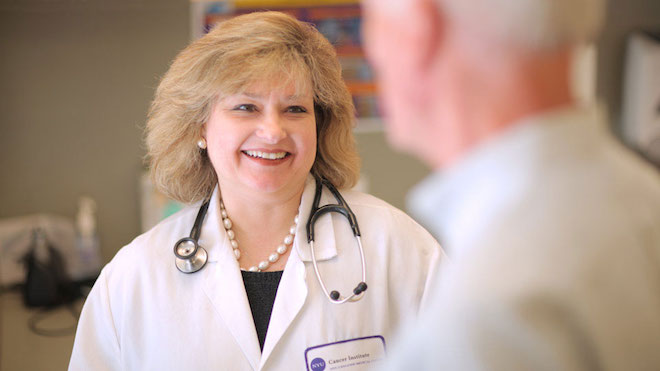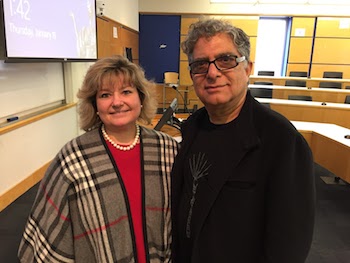
Dr. Anna Pavlick recently completed the Columbia Business School EMBA program, saying, “If you want it, go for it. You get one chance at this life and no one knows when it’s over.” Courtesy photo
Anna Pavlick remembers it like it happened yesterday: She’d decided to pursue an MBA, and friends and family thought she was out of her mind. Why would a well-established clinical oncologist — one of “America’s Best Doctors for Cancer” — need to go back to school? Why would she want to?
Pavlick was 52 years old at the time and hadn’t sat in a classroom for more than 20 years. But she wasn’t about to let age, expectations, or other obstacles stop her. “Why,” she asked, “because I’m older with a successful career, can I not look to expand myself in other ways?”
Expand herself she did, enrolling in Columbia Business School’s executive MBA program two years ago. Expansion? You might say it was more of a transformation: Pavlick considers herself an entirely different person after graduating this spring from one of the most rigorous EMBA programs in the United States, ranked No. 7 by U.S. News & World Report. “For one, I’m more efficient,” she tells Poets&Quants. “I thought I was efficient before, but now I’m uber efficient.”
GREAT AT WHAT SHE DOES — AND WANTING TO DO MORE

Dr. Anna Pavlick with author and alternative medicine advocate Deepak Chopra. Pavlick took a course taught by Chopra in her second year at Columbia. Courtesy photo
Efficiency is not optional for an M.D. who treats between 80 and 100 melanoma patients every week while also serving as both professor of medicine and dermatology at the NYU School of Medicine and medical director of the NYU Cancer Center Clinical Trials Office. Given such a demanding schedule, it’s understandable that friends and family were baffled by the thought of adding a two-year EMBA program into the mix.
Why? was a logical question. Pavlick’s answer: It was time to expand out of science and learn something new.
“I have been fascinated by science ever since I was a kid,” she says. “All I’ve done is eat and drink science. But when you train in medicine, that’s truly all you’re taught. You learn nothing about business or the real world.”
Clearly, Pavlick’s lifelong study of science and medicine has served her well. She’s recognized as one of the leading investigators of melanoma cancer in the world, obtaining and testing treatment drugs in the hope of improving the survival rate of patients. And improve it she has. “When I started doing this 18 years ago, no one ever wanted to do it because nothing seemed to work,” she says. “We’d see a five-year survival rate at best. Now, we can walk into a case where, previously, nothing had worked, and we’re pushing a 70% control rate. Historically the control rate was around 5% and we’ve jumped to 70%.”
PERSISTING THROUGH THE CHALLENGES
That rate of success is a major reason why Pavlick has been named among America’s Top Doctors (Castle Connolly), Top Doctors for Cancer (Newsweek), and Best Doctors (New York Magazine) for the past seven consecutive years. Yet Pavlick set her sights on more — perhaps the chairmanship of an oncology department. She saw business school as the way to get there. “Will I trade my day job and go work on Wall Street? No way! They’d never hire me,” she says. “But I’d give myself an upper hand by adding business skills to my portfolio. I would love to be the chairman of a medicine or oncology department some day and increase my involvement in biotech startups.”
She had a goal. Getting there meant more than hard work — it meant opening herself up to fail, at least temporarily. Pavlick recalls her first EMBA semester being exceedingly tough. “I graduated medical school in 1990, so learning how to sit back down was difficult,” she says. There was also the balancing act of engaging in an aggressive curriculum and coursework while living an already jam-packed work life. “You have to re-discipline yourself on how to do it and when to do it,” Pavlick says. “All of it was quite challenging for me during our first semester.”
Still, she persisted. And, like many EMBAs, she did it by shifting priorities and compartmentalizing. “I rearranged my morning routine to study. I found ways to partition off time at work. Sundays were homework day or paper day. I hadn’t used a lot of vacation time, so I used vacation days to stay home and study,” she says. “You just figure it out.”
‘IF YOU WANT IT, GO FOR IT’
Having completed Columbia’s EMBA program, Anna Pavlick says her degree is just what the doctor ordered.
“I understand balance sheets and how businesses work. I can value a company just as well as anybody else,” she says. “The EMBA has not just given me valuable tools to apply to medicine and leadership roles within hospitals and academics, but to continue expanding my role into biotech companies as well.
“If there’s one thing I would emanate about this entire experience, it’s this: If you want it, go for it. You get one chance at this life and no one knows when it’s over.
“This was a conscious decision to put myself out there and really push myself to my limits. I was a fish out of water — trust me. Still, it’s the best thing I ever did. It totally changed my life.”
DON’T MISS 2017 BEST EMBAs: ANN PAVLICK, MD, COLUMBIA BUSINESS SCHOOL and KELLEY’S PHYSICIAN-ONLY MBA FOR BUSY DOCTORS





Questions about this article? Email us or leave a comment below.